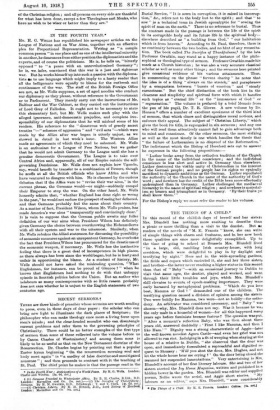IN Tii1 FOURTH YEAR.*
Mn. M. G. Wasse has republished his newspaper articles on the League of Nations and on War Aims, together with an effective plea for Proportional Representation. Writing as "a sample common person "in one place and as one of the intellectual minority in another, he denounces from either position the diplomatists and the experts, and of course the politicians. He is, he tells us, "bitterly opposed" to "a peace with an =revolutionized Germany "; he is, we. infer, convinced that this war is a just and righteous war. But he works himself up into such a passion with the diploma- tists as to use language which might imply to a hasty reader that all the belligerents were equally to blame for the outbreak and continuance of the war. The staff of the British Foreign Office are not, as Mr. Wells supposes, a set of aged noodles who conduct our diplomacy as they please, without reference to the Government or to Parliament. They merely carry out the instructions of Mr. Balfour and the War Cabinet, as they carried out the instructions of Lord Grey of Fallodon. It ought not to be necessary to state this elementary fact, but Mr. Wells makes such play with the alleged ignorance, anti-democratic prejudice, and complete irre- sponsibility of our diplomatists that he will mislead some of his readers. His reference to the "disastrous web of greedy secret treaties "—" schemes of aggression "and "evil acts "—which were made by the Allies after war began is utterly unjust, as we showed in detail in last week's issue. The Western Allies made no agreements of which they need be ashamed. Mr. Wells is an enthusiast for a League of Free Nations, but we gather that he would not admit Germany to the League until she has a genuine democratic Government. The League is to take over Central Africa and, apparently, all of our Empire outside the self- governing Dominions. Mr. Wells does not explain how Uganda, say, would benefit by transfer to a combination of Powers, though he scoffs at all the British officials who know Africa and who have ventured to disagree with him. He is obsessed by the curious delusion that if the Allies were to "revise their war aims," in the current phrase, the Germans would—or might—suddenly compel their Emperor to stop the war. On the other hand, Mr. Wells honestly admits that, "whether England has done right or wrong in the past," he would not endure the prospect of seeing her defeated, and that Germans probably feel the same about their country. As a matter of feet, President Wilson, whom Mr. Wells praises, has made America's war aims "transparently and convincingly clear." It is vain to suppose that the German public awaits any fuller definition of our war aims when President Wilson has definitely given Germany the choice between overthrowing the Hohen.zollerns with all their system and war to the uttermost. Similarly, when Mr. Wells rebukes the Allied statesmen for discussing the possibility of economic measures against an unrepentant Germany, he overlooks the fact that President Wilson has pronounced for the drastic use of the economic weapon, if necessary. Mr. Wells has the instinctive feeling that there is a great deal of incompetence in high places, as there always has been since the world began, but he is hasty and unfair in apportioning the blame. As a student of history, Mr. Wells should not have asked the misleading question, "What Englishman, for instance, can be proud of Glencoe ? " when he knows that Englishmen had nothing to do with that unhappy episode in Scottish polities before the Union. But an author who belabours so many contemporaries with so little reason probably floes not care whether he is unjust to the English statesmen of two centuries ago.


































 Previous page
Previous page